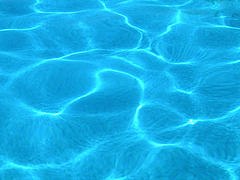 Most people know chlorine as the chemical that’s used to treat the water in swimming pools and hot tubs. But did you know that the very same chemical is used to treat our drinking water as well? In some homes, you might not even notice chlorine in your drinking water. In other homes, the water that comes out of your taps can reek of the chemical. Today we’re going to talk about why chlorine can be so pronounced in certain homes by answering the question, “Why does my drinking water smell like chlorine?”
Most people know chlorine as the chemical that’s used to treat the water in swimming pools and hot tubs. But did you know that the very same chemical is used to treat our drinking water as well? In some homes, you might not even notice chlorine in your drinking water. In other homes, the water that comes out of your taps can reek of the chemical. Today we’re going to talk about why chlorine can be so pronounced in certain homes by answering the question, “Why does my drinking water smell like chlorine?”
Chlorine is added to drinking water by water treatment plants
Chlorine is an extremely powerful disinfectant. Our local water treatment plants add chlorine to our drinking water in order to kill viruses and pathogens that would otherwise spread life-threatening waterborne illnesses. Treatment plants carefully monitor the amount of chlorine that’s added to our water supplies in order to keep it at a safe level. Even still, the powerful smell of the disinfectant can remain in the water that is delivered to our homes.
Why does my drinking water always smell like chlorine?
If your drinking water always smells like chlorine, it’s due to one of two things. First, your water treatment plant might use more chlorine than other treatment plants. The more chlorine that’s used, the more your water will smell.
Second, your home might be located relatively close to your treatment plant. The chlorine smell in water tends to dissipate as it travels to farther destinations. If your home is near your treatment plant, it will have a much stronger smell of chlorine than water from the same source that’s delivered to a home that’s farther away.
Why does my drinking water sometimes smell like chlorine?
If your drinking water doesn’t typically smell like chlorine but it develops the smell occasionally throughout the year, that’s often because your treatment plant uses different quantities of chlorine at different times of the year.
For example, some water treatment plants use chloramine (a mixture of chlorine and ammonia) throughout most of the year. Water that’s treated with chloramine has a lower concentration of chlorine than water that’s treated with just chlorine, so the water with chloramine might not smell too much. However, if the plant switches from chloramine to chlorine (which might happen when water tests positive for some kind of contaminant or when preventative measures are taken at certain times of the year), your tap water will have a much stronger smell of chlorine than usual.
How can I remove the chlorine smell from my drinking water?
Chlorine in our drinking water doesn’t just produce an off-putting smell; it can also harm our health. Although the amount of chlorine that’s added to our drinking water is supposed to be safe, the chemical can react with organic materials in water and create dangerous chemical byproducts known as THM’s that can lead to serious health problems after long-term exposure.
In order to remove the smell of chlorine from your drinking water, and to avoid the negative health effects of chlorine, it’s best to install a whole-house filtration system at home. The filters that we sell at EPA Water do an excellent job at removing chlorine from tap water, so your water will not only smell great, but also be perfectly safe to consume.
If you have any questions about why your drinking water smells like chlorine, or if you’d like a water system serviced or installed in your home, contact EPA Water Consultants, your whole house water filter and water softener dealer in Pennsylvania and New Jersey. We provide service all over Pennsylvania and New Jersey, including towns like Chalfont, New Hope and Doylestown, PA.
photo credit: metamerist via photopin cc
